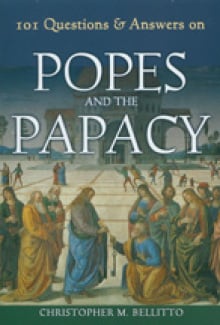Today’s topic is one of the most controversial–and misunderstood, for Catholics as well as non-Catholics: papal infallibility…
QUESTION: Do I have to believe every word the pope says?
Read more from the papal answer man, Chris Bellitto and his new book, 101 Questions on Popes and the Papacy.
ANSWER: Papal infallibility does not mean that every word the pope says is absolutely true and is an article of the Catholic faith that Catholics must believe or otherwise be considered outside the church. While this statement may seem like a straw man—a simplistic description that is easily blown down by the slightest breath of defense or explanation—I am frequently reminded that some version of this statement is really what people still think of when they wonder what “papal infallibility” means.
 Catholic theology teaches that the pope, as a sign of unity, by the authority of his succession to Peter and through his role as bishop of Rome holds in trust those doctrines that make Catholic belief Catholic. He shares this authority with his brother bishops who likewise teach Catholic beliefs throughout the world.
Catholic theology teaches that the pope, as a sign of unity, by the authority of his succession to Peter and through his role as bishop of Rome holds in trust those doctrines that make Catholic belief Catholic. He shares this authority with his brother bishops who likewise teach Catholic beliefs throughout the world.
There is a difference between dogma and discipline, however. Belief in the Real Presence, a dogma, will not change though our language to describe it could. A discipline, like whether priests in the western church must be celibate, might in fact change. Catholics must obey the pope when he is making those ex cathedra statements that are binding on all the faithful. At the same time, the church distinguishes the relative authority of other papal statements in public addresses, interviews, and homilies in addition to formal writings such as encyclicals and apostolic letters.
Even among the latter, non-ex cathedra statements, however, the church believes Catholics must have a certain deference and submission of the will and intellect—to use the fancier language found in certain church documents—even on matters that have not been pronounced definitively. We should acknowledge, however, that the Vatican is not always clear on the level of authority behind a particular statement or writing. Many would like Vatican teachings to be labeled clearly as to just what level of teaching authority a particular statement holds, while others are more comfortable with the ambiguity for a variety of reasons. Private opinions, such as what a pope may think of a book, movie, politician, or governmental action are another matter entirely.
–From “101 Questions on Popes and the Papacy” by Christopher M. Bellitto; published by the Paulist Press and reprinted with permission of the publisher.

